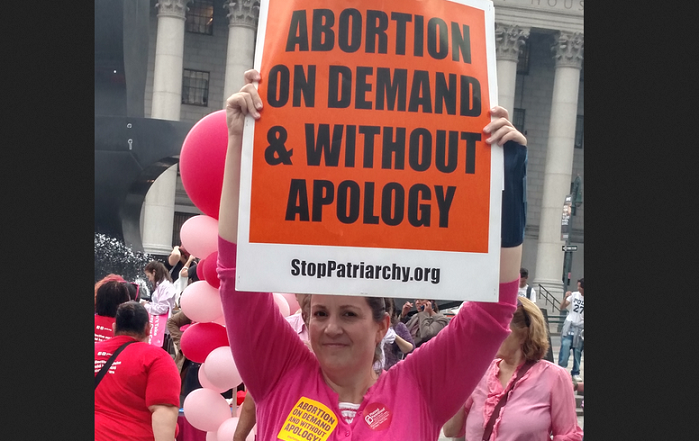Ignoring a deadline that ended more than three decades ago, the Virginia Senate and state Assembly voted today to ratify the pro-abortion Equal Rights Amendment (ERA) to the U.S. Constitution.
The vote happened just days after the U.S. Department of Justice said the ERA is dead because the 1982 deadline set by Congress has passed.
The ERA would amend the U.S. Constitution to guarantee equal rights for all born citizens no matter what their sex is. Though the intent seems good on the surface, pro-life leaders long have warned that abortion activists would use the amendment to destroy the limited protections that America provides to unborn babies. Under the amendment, even widely-supported abortion regulations such as the partial-birth abortion ban and parental consent for minors could be overturned. It also could force taxpayers to pay for abortions, something polls consistently show most Americans oppose.
Olivia Turner, the head of the Virginia Society for Human Life, told LifeNews.com she was disappointed by the news:
“This is a sad day not only for Virginia, but also for the entire country. The pro-abortion 1972 Equal Rights Amendment, if ratified, will lead to radical pro-abortion promoters finally having the perfect weapon to use against sensible protective pro-life laws, and also to force all taxpayers to pay for every abortion and to prevent passage of new laws that could protect women and babies from unscrupulous abortionists.”
Recently, pro-life women leaders rallied against the ERA in Virginia, according to Capital News Service.
Victoria Cobb, president of the Family Foundation of Virginia, warned that the language in the amendment is vague and could be interpreted to allow abortion on demand. She said she believes women already have achieved equality, according to the report.
“Today I am different than men and yet equal under the U.S. Constitution, and Virginia Constitution and Virginia laws,” Cobb said.
Follow LifeNews.com on Instagram for pro-life pictures and videos.
Students for Life regional coordinator Stephanie Stone also raised concerns that abortion activists will use the amendment to end all protections for babies in the womb, the report continues.
On its website, the pro-abortion group NARAL said the ERA would “reinforce the constitutional right to abortion by clarifying that the sexes have equal rights, which would require judges to strike down anti-abortion laws because they violate both the constitutional rights to privacy and sexual equality.”
Earlier this week, the U.S. Department of Justice said it is too late for states to ratify the amendment.
“We conclude that Congress had the constitutional authority to impose a deadline on the ratification of the ERA and, because that deadline has expired, the ERA Resolution is no longer pending before the States,” it stated.
The DOJ cited statute 1 U.S.C. § 106b, which says that Congress has the authority to set a deadline for ratifying a Constitutional amendment. According to the DOJ, the U.S. Supreme Court upheld Congress’s authority to impose the deadline as well.
The only constitutional avenue to adoption of an ERA would be for ERA proponents to start over, requiring two-thirds approval in each house of Congress, followed by a new round of consideration by state legislatures, the OLC memo concluded.
OLC’s function is to advise Legislative Branch agencies on major legal issues. Therefore, the January 6 opinion now governs the actions of the Archivist of the United States, David Ferriero, to whom it was directed. This means that when the Virginia legislature transmits its “ratification” papers to Ferriero, he will not certify that the ERA has been ratified and made part of the Constitution, which are functions that the Archivist would perform in the case of a genuine ratification.
In a January 9 statement, the National Archives and Records Administration (NARA), the agency that Ferriero heads, said, “NARA defers to DOJ on this issue and will abide by the OLC opinion, unless otherwise directed by a final court order.”
The OLC opinion also forcefully rejected the theory that Congress could retroactively nullify the ratification deadline on the 1972 ERA, which is the premise of a measure that the Democrat-controlled U.S. House of Representatives is expected to take up soon (H.J. Res. 79).
However, pro-abortion Democrats, who now control the Virginia legislature, are pushing ahead with the ERA anyway. In the view of pro-ERA activists, Virginia will be the 38th state to ratify the ERA, thereby meeting the constitutional requirement of ratification by three-quarters of the 50 states. Pro-ERA advocacy groups are already proclaiming that the Virginia legislature’s action will be the successful culmination of decades of struggle for constitutional “equality.”
However, there are many who find these claims implausible.
“This is an attempt to air-drop into the Constitution a sweeping provision that could be used to attack any federal, state, or local law or policy that in any way limits abortion — abortion in the final months, partial-birth abortion, abortions on minors, government funding of abortion, conscience-protection laws, you name it,” said Douglas D. Johnson, who directed NRL’s ERA-related efforts during his years as NRL Federal Legislative Director (1981-2016), and continues to do so today as NRL Senior Policy Advisor.
“Pro-abortion advocates have been unable to accomplish their goal by the amendment process provided in Article V of the Constitution – their proposal expired unratified 40 years ago — so they are attempting to accomplish it through a brazen political campaign, dressed up in legal terminology,” Johnson said.
U.S. Congress set a seven-year deadline for the ratification of the amendment, but it ended in 1982. Some pro-abortion lawmakers have ignored the deadline and passed the amendment anyway, including the Nevada legislature in 2017 and Illinois in 2018.
Meanwhile, several other states rescinded their ratification of the ERA.
If Virginia does ratify the ERA, a court challenge is almost certain.








